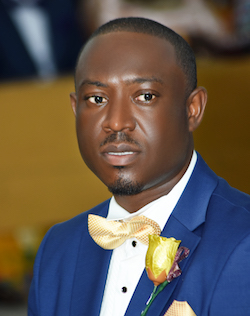 Dabone Atta Snr.
Dabone Atta Snr.
Senior Economics Officer
Debt Management Division
Ministry of Finance, Government of Ghana
Master of Public Policy (’10)
Please tell us about your career path so far. What is your area of specialization and how did you come to work in this area?
I am an astute debt analyst with over thirteen years of experience, working with the Ministry of Finance in Ghana. I hold a Master’s in Public Policy (Economics) and a Bachelor of Science Degree in Economics. Having a strong passion for issues on economic development and poverty eradication in Ghana and Africa at large, I aspired for a career that will enable me to contribute my quota directly towards the development of Ghana.
I joined the Ministry of Finance in November 2004 to do my National Service, after graduating from the Methodist University College Ghana, in May, 2004. I was later employed in 2006 as an Assistant Economic Officer after having gone through a successful interview. I have since been promoted to the position of a Senior Economics Officer and currently awaiting confirmation to a Principal Economics Officer. Over the period, I have worked in different roles and schedules in the Debt Management Division, where I currently serve as the Deputy Head of the Financing and Investor Relations Unit. Working in this Division has challenged me to be a critical thinker and analyst, where I model, evaluate and advise management on sound debt management policies to help meet Government’s overall economic policy objectives.
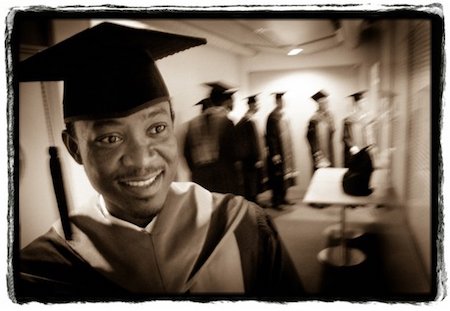
At Graduation Day, September 2010 (photo by Julen Esteban-Pretel)
My long term career goal is to advance into a management position where I can be directly involved in the decision making process and implement cogent research-based economic policies to help move Ghana to a high income country. It is in support of my career aspirations that I applied and won the Japanese Government (MEXT) Scholarship to study for a Master of Public Policy at GRIPS. Upon completion of my studies at GRIPS in the year 2010, I returned to my job at the Ministry of Finance.
You are currently working as Senior Economics Officer in the Ministry of Finance. What are your main roles and responsibilities?
I am a Senior Economics Officer and the Deputy Head of the Financing and Investor Relations Unit of the Debt Management Division. In my current role, I manage the External Debt Financing Portfolio. My main responsibilities are summarized below:
Coordinate Government’s International Capital Market Issuances:
- engage transaction advisors and seek the needed regulatory approvals;
- prepare prospectus for the issuance, in collaboration with transaction advisors;
- undertake road shows and town hall meetings and issue the bond; and
- ensure that all other conditions are met.
Lead the process for Government’s loans sourced from commercial creditors:
- evaluate financing terms of new Government loans;
- prepare loan agreement documentations and seek the needed regulatory approvals;
- provide support on Public Private Partnership (PPP) related issues.
- prepare monthly and quarterly reports on external financing activities;
- prepare memos to advise government on debt financing issues;
- meet investors periodically to advise on Ghana’s debt management policies.
Assist in the formulation of annual debt management strategy
- liaise with other units in the Division to formulate the annual debt management strategy;
- engage staff in my unit to operationalize the annual strategy;
- periodically review the strategy.
In your current capacity, what do you see as the main opportunities and challenges for Ghana over the course of the next five to ten years?
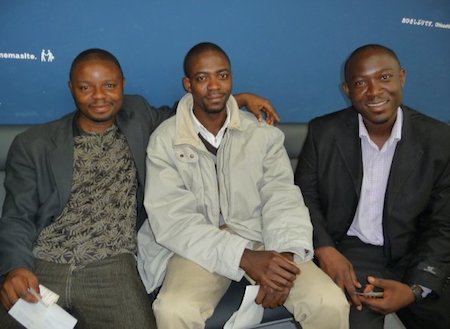
With Ghana Ministry of Finance colleagues and fellow GRIPS students Peter Aidoo and Mohammed Shafiq Mamudu.
The government is currently championing the ‘Ghana Beyond Aid’ agenda, which seeks to move Ghana from an aid-dependent nation to a self-reliant nation and promote development. There are therefore a number of government interventions to facilitate doing business in Ghana and promote both domestic and foreign investments, particularly in the area of infrastructure development.
Ghana currently has a developed and well-functioning capital market which attracts both domestic and international portfolio flows to support the government’s development programmes. This is however hinged on strong fiscal discipline and clearly outlined debt management strategy.
The government has also introduced a number of education and health policies to develop its human capital base. In the next 5 to 10 years, Ghana will have a highly skilled labour force capable of taking advantage of rapid technological change to boost productivity and increase economic competitiveness.
These positive developments notwithstanding, Ghana faces a challenge of weak institutions and it is for this reason that the government is taking necessary steps to address some institutional lapses and revamp the public sector to deliver effectively and efficiently.
What are some of the biggest challenges you face in your work? And what have been the most interesting or rewarding aspects of your career thus far?
As a debt analyst mindful of the rising debt levels, one of the key challenges I face in my work is how to align economic policies and social policies to ensure that the government can raise adequate funding either externally or domestically to fund key pro-poor social interventions while managing the debt levels and other risk exposures. I envisage this challenge to become even more pronounced as Ghana moves to a self-reliant economy, with decreased access to concessional funding.
The opportunity given to me by the Ministry to participate annually in the development of key policy initiatives gives me joy, most especially when I see my contributions in the National Budget and Economic Policy Statement every year and its impact on boosting economic development.
You have recently been appointed as Deputy Board Chairman of Foklex Media Awards. Please tell us more about these awards and your role in it.
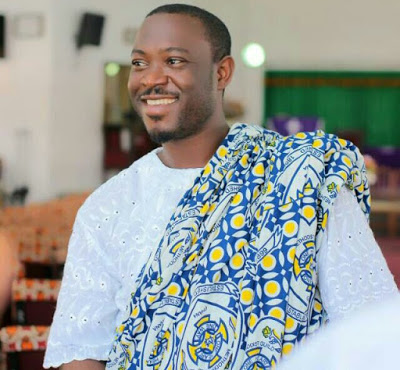
The happy Deputy Chairman of Foklex Media Awards
Foklex Media Awards/ Production is a private organization whose core mandate is to strengthen and promote media engagement in Ghana, as a tool for championing societal change and development. In line with this, Foklex Media has instituted an awards scheme, which has been running for the past 7 years, to honor outstanding radio personalities working in various radio stations who have impacted lives positively through their work in Ghana.
I was appointed as the Deputy Board Chairman in the later part of 2017 based on my vast experiences and contribution to media development in Ghana. I lead the awards process which includes shortlisting nominees and reviewing their work to select deserving journalists who have commended themselves to the hearts of their listeners, and have excelled in their respective fields to bring about a positive change. I also coordinate the events planning team and help to raise funds in support of the organization’s operations.
What led you to GRIPS? What is the most important thing you got out of your studies here, and how has your experience at GRIPS prepared you for future endeavours?
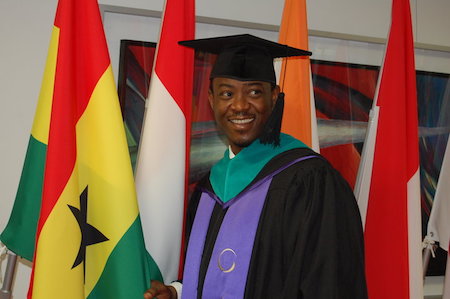
Proudly posing in front of the national flag of Ghana at the Graduation Day.
I chose to study in GRIPS in my pursuit for academic excellence. Before making the decision, I perused the course structure and I was enthused by strong inter-disciplinary approach to studies offered and the vast range of skills one could acquire. Additionally, the caliber and skills of faculty members of the university was admirable. I also wanted to study in a culturally diverse environment to enhance my communication and other social skills. GRIPS was just perfect to meet my needs, and I have never regretted my decision.
One thing I can boast of is that I was trained of how to design and implement policies that will yield good results for low and middle income countries. This boosted my confidence to return home to serve as an agent of change. I therefore came back to the Ministry of Finance, Ghana immediately after the course since I was in hurry to impact the knowledge I have acquired from GRIPS. My contributions at the work place have been tremendously phenomenal. In fact, the entire Ministry has benefited from my GRIPS education because years ago, the Ministry would have otherwise hired a consultant to perform the role and responsibilities I currently handle in my line of work. The knowledge I acquired during my study at GRIPS together with other soft skills acquired through my interactions have helped me so much in my career and I thank the Japanese Government for this wonderful opportunity given to me. GRIPS gave me confidence and I can say my future within the civil service is very bright.
Have you had any involvement, professional or otherwise, with Japan since your graduation?
Yes, I had the opportunity to attend an Executive Program in Public Finance Management / Government Debt Management in July 24, 2016 ~ August 6, 2016 in Tokyo which was sponsored by JICA. The course was aimed at strengthening the capacity of target government officials on public financial management by way of providing lectures and exercises including practical skills and knowledge on government debt management, as well as specific focus on strategic framework of Asset and Liability Management.
How do you maintain a balance between your work and the rest of your life? And what is your favorite thing to do when you are not working?

Atta with his twin brother, with whom he has established Voice FM 94.3, one of the leading radio stations in Ghana.
I have developed a broad interest in a lot of social activities which helps me to keep a healthy work-life balance. Primarily, I mostly spend quality time with my family when I am not working. God has blessed my wife (Joycelyn) and I with two daughters (Weslie and Stacy) and I love spending my leisure time with them.
In my small way of ensuring food security, I started small scale rabbit and quail farming for my family and also to share with the needy in the community. This has since grown into a large scale project and I currently own about 1800 rabbits and 1200 quails. I enjoy taking care of them. We supply some restaurants in Ghana with our rabbits and also do rabbit kebab and get orders for parties, funerals and other social gatherings. For the quails we sell their eggs and we are one of the leading marketers for the quail’s eggs in Ghana with our brand name D & J Farms.
Additionally, as a way of giving back to the community where we were born and bred, my twin brother and I opened a radio station (Voice FM 94.3) in my hometown. It is currently one of the leading radio stations in Ghana. I do manage some of their production work and content development in my leisure time.
What are some of your fondest memories of your time spent at GRIPS? And what do you miss about Japan?
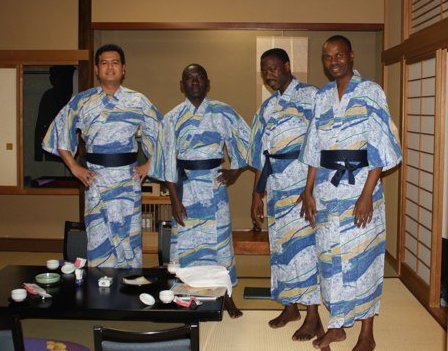
Outing with GRIPS fellow students in Niigata
There are many fond memories of my time at GRIPS. Notably, my election into the office of Head of Academic Affairs for that 2009/2010-year group in GRIPS. Assisting people from various countries on academic issues and to cope with the academic challenges was a wonderful and rewarding experience. I made a lot of friends as the Head of the Academic Affairs. Deep within my heart, setting up GRIPS Christian Campus Fellowship on GRIPS campus is a joy to me. This gave an opportunity for Christians from various countries to meet under one umbrella to pray and also support one another. Again, the cross-cultural exchange programmes organized amongst students at TIEC in Odaiba were exceptional. I remember I was adjudged the best traditional dressed in the 2009/2010 at the TIEC cultural dress competition in Odaiba and this is still fresh in my mind.
I miss Japan for its high tech-based economy that allows daily tasks to be done with the speed of time, for example the Yurikamome train, and also the warmth of the people and the strict adherence to order. I also enjoyed my skiing trips in Niigata and the famous local sake.
If you could give one piece of advice to anyone considering studying at GRIPS what would it be?
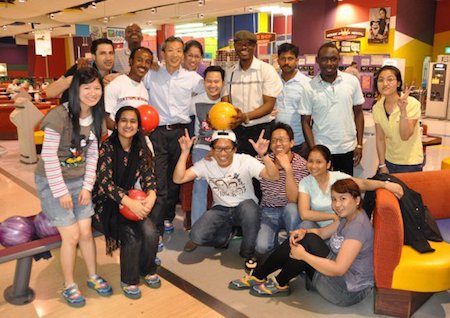
Bowling party with fellow Public Policy students and Prof. Yoshida.
GRIPS offers you the opportunity to study in one of the world’s leading graduate institutes that emphasizes developing critical thinking and problem solving skills. The cross-disciplinary approach to studies and research ensures that you acquire a wide range of knowledge and skill set to analyze issues holistically. The institutes also provides students with the state-of-the-art study environment and facilities to support their studies. GRIPS also has a very strong and credible faculty to assist students. The opportunity to also study in a culturally diverse community will expand your horizon and hone your interpersonal and communication skills, making you a better citizen of the world. The GRIPS education is building the world’s transformational leaders.
How would you like to maintain involved with the School? What do you expect from GRIPS as an alumnus and do you have any suggestions on how to further utilize the GRIPS alumni network?
GRIPS can introduce a mentoring programme where an alumni can be paired with incoming or current students to mentor them on coping with both academic and social life in Japan. We can also strengthen country alumni engagements and collaborate on development projects. We suggest that for countries with an alumni base of at least five persons, GRIPS should coordinate reunions and other programmes for which reports will be submitted to the Alumni Office. GRIPS can also offer opportunities for alumni to collaborate with faculty in the area of research.





